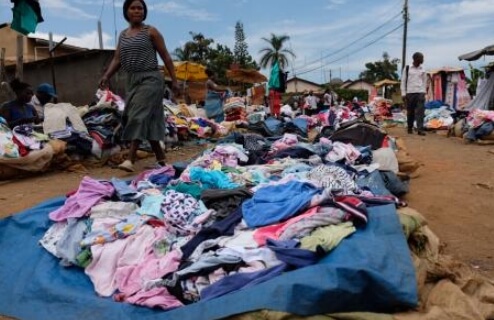As the demand for Ghana used clothes surges, the fashion and economic fabric of the nation is undergoing a transformation. From the bustling markets of Kantamanto to local street vendors, secondhand clothes have become a staple of everyday life. This booming industry is offering more than just affordable fashion; it’s creating jobs, driving trade, and influencing local design sensibilities. In this post, we examine how the proliferation of used clothes in Ghana is impacting both the economy and fashion industry.

1. Introduction: The Growing Demand for Ghana Used Clothes
The demand for Ghana used clothes has grown significantly, with secondhand markets becoming a cornerstone of the country’s fashion economy. These imported garments, sourced primarily from Western nations, offer affordable alternatives for consumers while catering to various tastes and styles. As Ghana used clothes flood local markets, they are not only influencing individual fashion choices but also driving economic activities in both urban and rural areas, creating a sustainable and dynamic industry.
Overview of the Secondhand Clothing Industry in Ghana
The secondhand clothing industry, especially in cities like Accra, plays a crucial role in the everyday lives of many Ghanaians. Ghana used clothes have created a thriving ecosystem where sellers, traders, and consumers all benefit from the availability of low-cost, high-quality apparel. This trade supports thousands of livelihoods and continues to grow as demand increases.
How Used Clothes Are Becoming a Staple in Ghanaian Markets
Ghana used clothes have integrated deeply into the local economy, becoming a reliable source of affordable fashion for a majority of the population. Street markets and major hubs like Kantamanto have turned into bustling centers where used clothes dominate sales, offering consumers diverse and accessible fashion options that are both practical and trendy.

2. The Economic Impact of Ghana Used Clothes
The economic significance of Ghana used clothes cannot be overstated. The trade of secondhand garments has created numerous job opportunities, from market vendors to importers, and has helped fuel local economies. In addition, it has provided affordable clothing options for low-income families, contributing to economic inclusivity and allowing for the circulation of money within smaller communities.
Job Creation and Employment in the Secondhand Clothing Sector
The Ghana used clothes industry has become a major source of employment, particularly in urban areas where vendors, tailors, and transport workers rely on the trade. This sector has helped reduce unemployment by providing income for thousands of Ghanaians who participate in the resale and distribution of used garments.
Trade and Economic Benefits at Local and National Levels
At both the local and national levels, the Ghana used clothes market generates significant economic benefits. Imports of secondhand clothing bring revenue to the government through taxes and duties, while local traders profit from reselling these garments, supporting families and small businesses across the country.
The Role of Imports in Driving the Industry’s Growth
Imports are the lifeblood of Ghana used clothes, with shipments arriving regularly from Europe and North America. These imports provide an abundant supply of clothing that keeps prices low and supports the continuous expansion of the secondhand clothing sector, making it one of the fastest-growing industries in Ghana.
3. How Ghana Used Clothes are Shaping Local Fashion
Ghana used clothes have played a pivotal role in shaping local fashion trends, introducing a unique blend of Western styles and traditional Ghanaian aesthetics. The diversity of secondhand garments allows consumers to experiment with their style, mixing global fashion elements with local cultural influences. This evolution has made secondhand clothing a vital part of Ghana’s fashion identity.

Influence of Secondhand Apparel on Ghanaian Fashion Trends
Secondhand apparel has allowed Ghanaians to keep up with global fashion trends without the need for expensive new clothing. Ghana used clothes often include trendy, high-quality items that make global fashion accessible to everyone, encouraging creativity and individuality in personal style.
The Rise of Unique, Affordable Styles Through Used Clothing
The affordability of Ghana used clothes has made it easier for consumers to experiment with their fashion choices. This access to diverse and unique styles has given rise to a thriving culture of self-expression, where secondhand clothing serves as a canvas for creating new fashion statements at a fraction of the cost.
Local Adaptation and Blending of Global Fashion Influences
Ghanaians have mastered the art of blending imported fashion with their traditional attire. Ghana used clothes, while often originating from the West, are creatively adapted to fit the local culture, creating a fusion of styles that resonates with both modern and traditional fashion sensibilities.
4. Challenges Facing the Ghana Used Clothes Market
Despite the success of Ghana used clothes, the market faces several challenges, including environmental concerns and issues with quality control. As reliance on secondhand imports grows, there is a need to address the impact on local textile industries and consider the sustainability of the sector long term.
Issues with Over-Reliance on Imports and Local Production Impact
The influx of Ghana used clothes has raised concerns about the decline of local textile production. As more consumers turn to affordable secondhand garments, local manufacturers struggle to compete, threatening the future of domestic clothing production and raising questions about the long-term impact on the industry.
Environmental Concerns and Sustainability Challenges
Ghana used clothes contribute to a global problem of textile waste, with some items being of too low quality to be resold, leading to significant amounts of waste in landfills. Addressing these environmental concerns is crucial to ensuring that the industry remains sustainable in the future.
Quality Control and Public Health Considerations
Quality control remains a concern in the Ghana used clothes market. While many items are in good condition, some low-quality imports pose public health risks. Ensuring that only safe and wearable garments enter the market is essential to maintaining consumer trust and protecting public health.
5. The Future of Ghana’s Used Clothes Industry
The future of Ghana used clothes looks promising, with the potential for further growth and innovation. As more people embrace sustainable fashion, the secondhand market is set to expand, offering new opportunities for both economic development and environmental responsibility.
Potential for Growth and Expansion in the Secondhand Market
As the demand for sustainable fashion increases worldwide, Ghana used clothes are well-positioned to meet both local and international needs. The market has the potential to grow, with new business models and platforms offering further expansion opportunities for traders and consumers alike.
Sustainable Fashion and the Push for Eco-Friendly Practices
Ghana used clothes are becoming a key part of the global sustainable fashion movement. By promoting reuse and reducing the demand for new clothing production, the industry helps combat textile waste and contributes to a more eco-friendly fashion economy.
Government Policies and Regulations Shaping the Industry’s Future
The Ghanaian government is expected to play a pivotal role in regulating the future of the secondhand clothing market. Policies that promote sustainable practices, regulate imports, and support local industries will be critical in ensuring that the Ghana used clothes market remains vibrant and beneficial for the economy.

6. Conclusion: The Dual Impact on Fashion and Economy
In conclusion, Ghana used clothes have had a profound impact on both fashion and the economy. They have reshaped the way Ghanaians engage with fashion while driving job creation and economic growth. However, addressing the challenges that come with over-reliance on imports and sustainability concerns will be key to ensuring the long-term success

